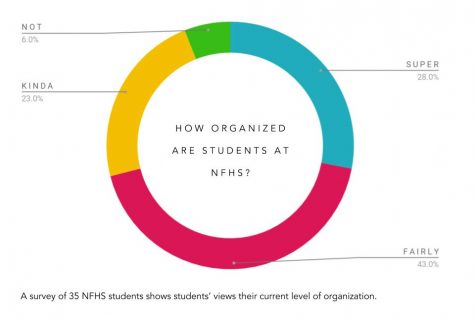How to Organize Your School Life: Beyond the Basics
October 1, 2018
We have all heard the classic advice that comes in droves from adults every fall:
“Buy colored labels!”
“Buy all of the highlighters!”
“Buy colored folders, pens, notebooks, washi tape, staplers, and a therapy cat!”
In the contrasting reality, staying organized in high school takes so much more than a crazy spectrum of school supplies. Here is how you can stay on top of things for the next nine months, beyond the nitty-gritty tips we have all already heard.
-
- Get a planner. Okay, you have most likely heard this pearl of wisdom before, but hear me out. It goes beyond the getting of the planner. For this method to be effective, you must use said planner. Quite an understatement would be to say my grades would have dropped if not for me using my planner. From homework, to test dates and due dates, to to-do lists, it is much more difficult to lose track of important tasks and times when it is all written down. It also helps to prioritize and put your tasks in order. Start out with simple assignments: those that can be finished in just a few minutes. Following those should be homework that is due the next day and then projects that require nightly commitment.
- Pick a note-taking style that suits you and stick with it. One that has worked extremely well for many students, myself included, is what I like to call the “I am Confused” method. With this method, you take notes as you regularly would, but every time your teacher says something that makes you think I am confused, write it on a separate sheet of paper. By the end of the class, you should have a few notes collected on your separate page. You can use these notes as guidelines for questions that you need to ask fellow classmates or teachers before the corresponding assessment. *Credit for this method goes to Mr. Nelson. In fact, Jenna Buggs, a current senior and AP Biology student, said that this method “has really helped a lot… By the end of the unit, [she] can go back and review… and see if [she understands the trickier topics] now or if [she] needs to ask the teacher for assistance.” Other methods that tend to work for students include color-coding, creating an outline, creating a mind map, or using the two-column Cornell method.
- Have at least one student from each class that you can contact, if necessary. That way, you can easily contact this student if you forget a test/due date, if you miss a day and need to catch up or if you are confused about something from that day in class.
- Pack up your bag every night in preparation for the morning. As high schoolers, we are notorious for sleeping in and therefore not having time to get our lives together every morning. On that note, preparing your backpack, lunch, outfit and whatever else you need for school the night before can be a much-welcomed stress reliever in these demanding days.
- Figure out what works for you. In terms of organization, studying, time management, and planning, everyone works in a different way. Whatever methods prove to be most effective for you, find them and stick with them.
- Remember what is important to you. The stress of school can really pile up. It is important to check your priorities every once in a while. Are you focusing on what truly matters to you? If not, it might be time to reconsider what you are spending your time on. This can save you from a lot of second-guessing down the road.















